Counterspin on Shopping Search: Shady Paid Inclusion
Bing caused a big stink today when they unveiled Scroogled, a site that highlights how Google Shopping has went paid-inclusion only. A couple weeks ago Google announced that they would be taking their controvercial business model global, in spite of it being "a mess."
Nextag has long been critical of Google's shifts on the shopping search front. Are their complaints legitimate, or are they just whiners?
Data, More Reliable Than Spin
Nothing beats data, so lets start with that.
This is what Nextag's search exposure has done over the past few years, according to SearchMetrics.
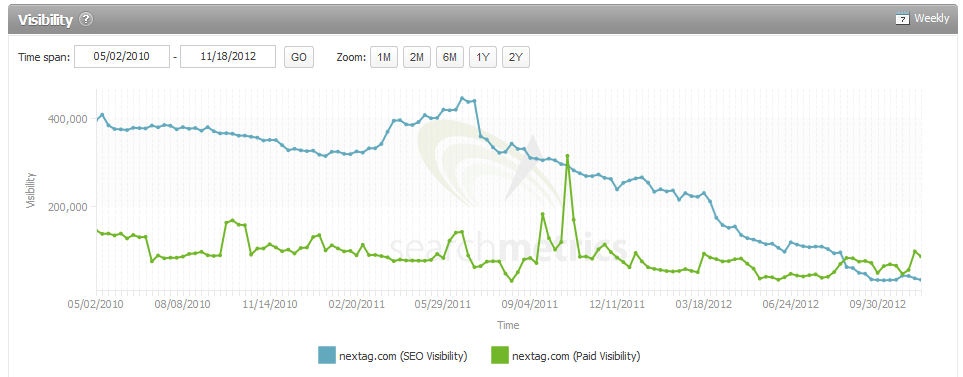
If Google did that to any large & politically connected company, you can bet regulators would have already took action against Google, rather than currently negotiating with them.
What's more telling is how some other sites in the shopping search vertical have performed.
PriceGrabber, another player in the shopping search market, has also slowly drifted downward (though at a much slower rate).
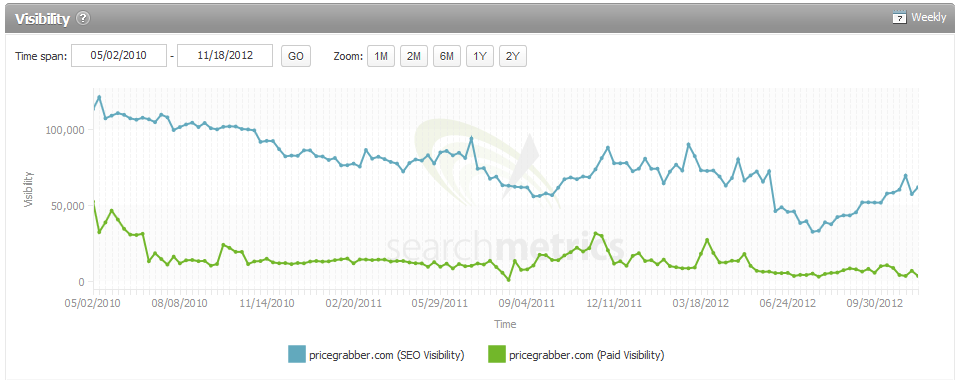
One of the few shopping search engines that has seen a big lift over this time period was Yahoo! Shopping.
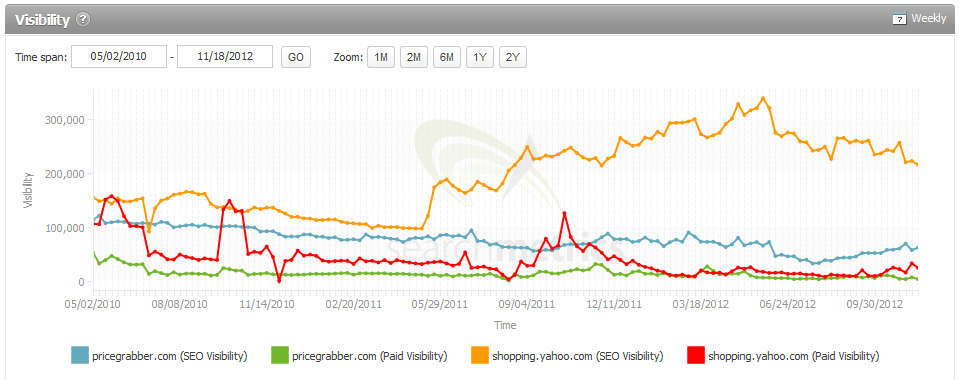
What is interesting about that rise is that Yahoo! outsourced substantially all of their shopping search product to PriceGrabber.
A Self-Destructing Market Dynamic
The above creates an interesting market dynamic...
- the long established market leader can wither on the vine for being too focused on their niche market & not broadening out in ways that increase brand awareness
- a larger site with loads of usage data can outsource the vertical and win based on the bleed of usage data across services & the ability to cross promote the site
- the company investing in creating the architecture & baseline system that powers other sites continues to slide due to limited brand & a larger entity gets to displace the data source
- Google then directly enters the market, further displacing some of the vertical players
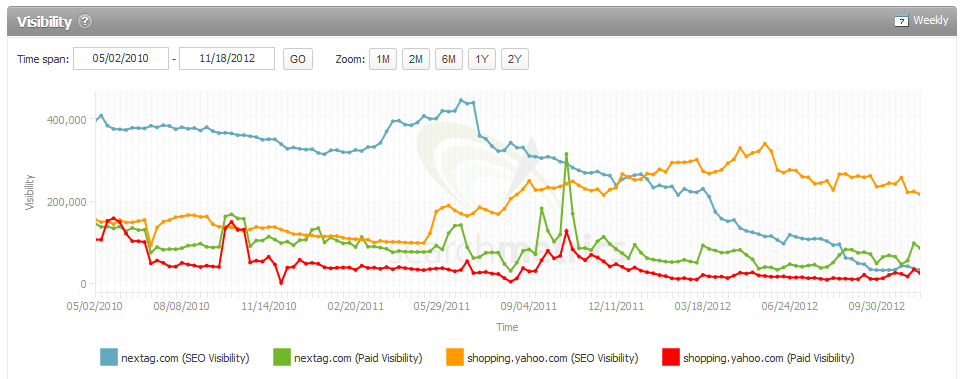
The above puts Nextag's slide in perspective, but the problem is that they still have fixed costs to manage if they are going to maintain their editorial quality. Google can hand out badges for people willing to improve their product for free or give searchers a "Click any fact to locate it on the web. Click Wrong? to report a problem" but others who operated with such loose editorial standards would likely be labeled as a spammer of one stripe or another.
Scrape-N-Displace
Most businesses have to earn the right to have exposure. They have to compete in the ecosystem, built awareness & so on. But Google can come in from the top of the market with an inferior product, displace the competition, economically starve them & eventually create a competitive product over time through a combination of incremental editorial improvements and gutting the traffic & cash flow to competing sites.
"The difference between life and death is remarkably small. And it’s not until you face it directly that you realize your own mortality." - Dustin Curtis
The above quote is every bit as much true for businesses as it is for people. Nothing more than a threat of a potential entry into a market can cut off the flow of investment & paralyze businesses in fear.
- If you have stuff behind a paywall or pre-roll ads you might have "poor user experience metrics" that get you hit by Panda.
- If you make your information semi-accessible to Googlebot you might get hit by Panda for having too much similar content.
- If you are not YouTube & you have a bunch of stolen content on your site you might get hit by a copyright penalty.
- If you leave your information fully accessible publicly you get to die by scrape-n-displace.
- If you are more clever about information presentation perhaps you get a hand penlty for cloaking.
None of those is a particularly desirable way to have your business die.
Editorial Integrity
In addition to having a non-comprehensive database, Google Shopping also suffers from the problem of line extension (who buys video games from Staples?).
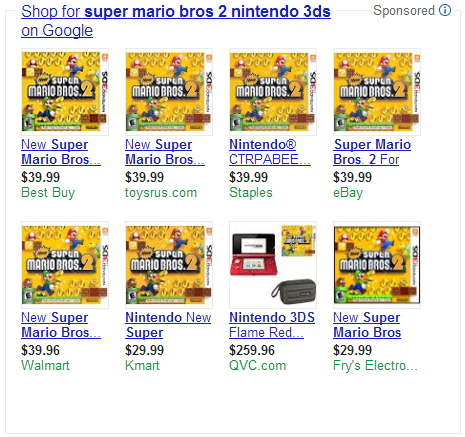
The bigger issue is that issue of general editorial integrity.
Are products in stock? Sometimes no.
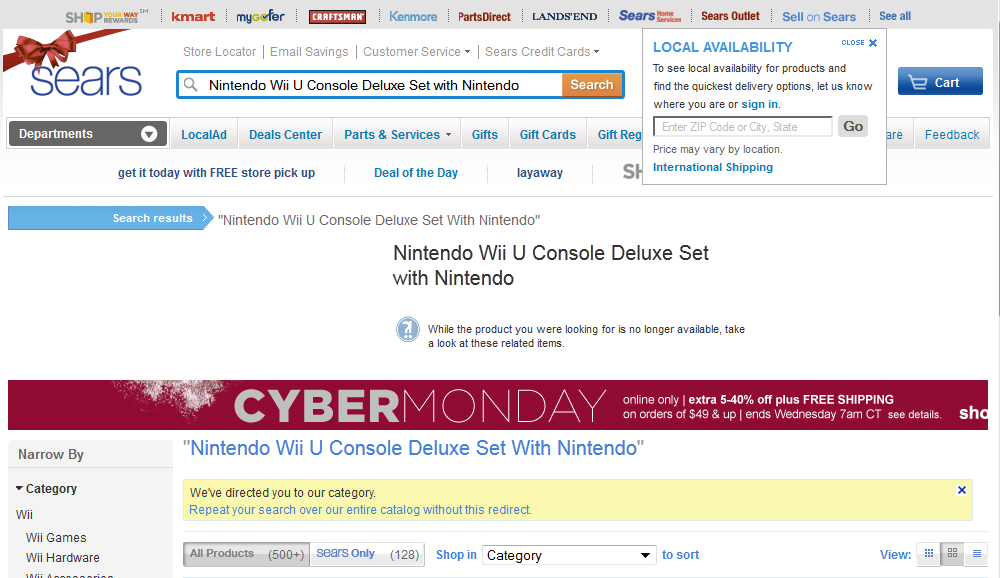
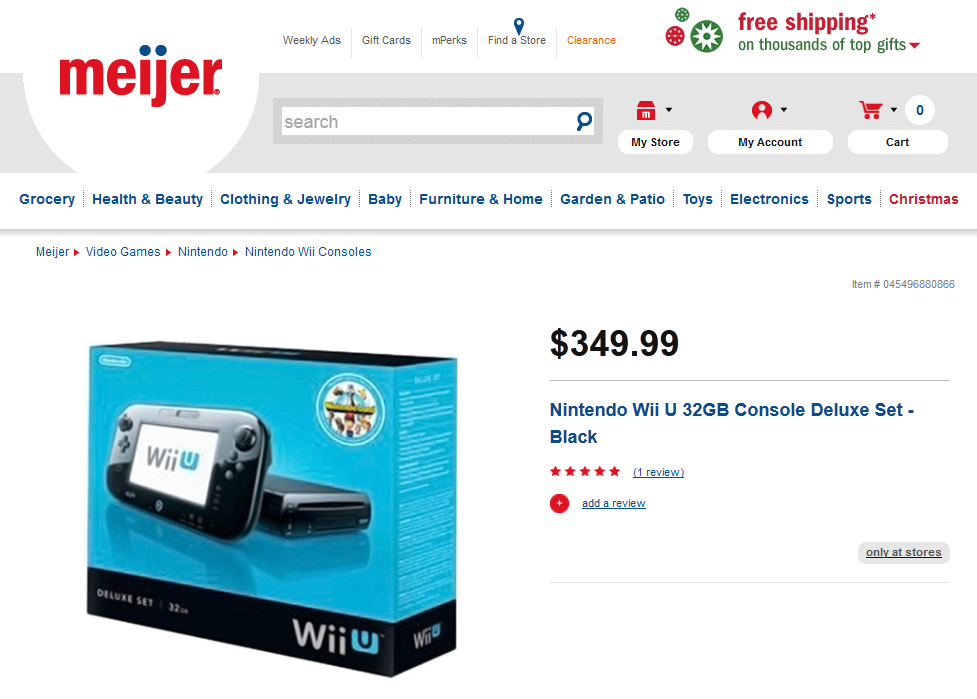
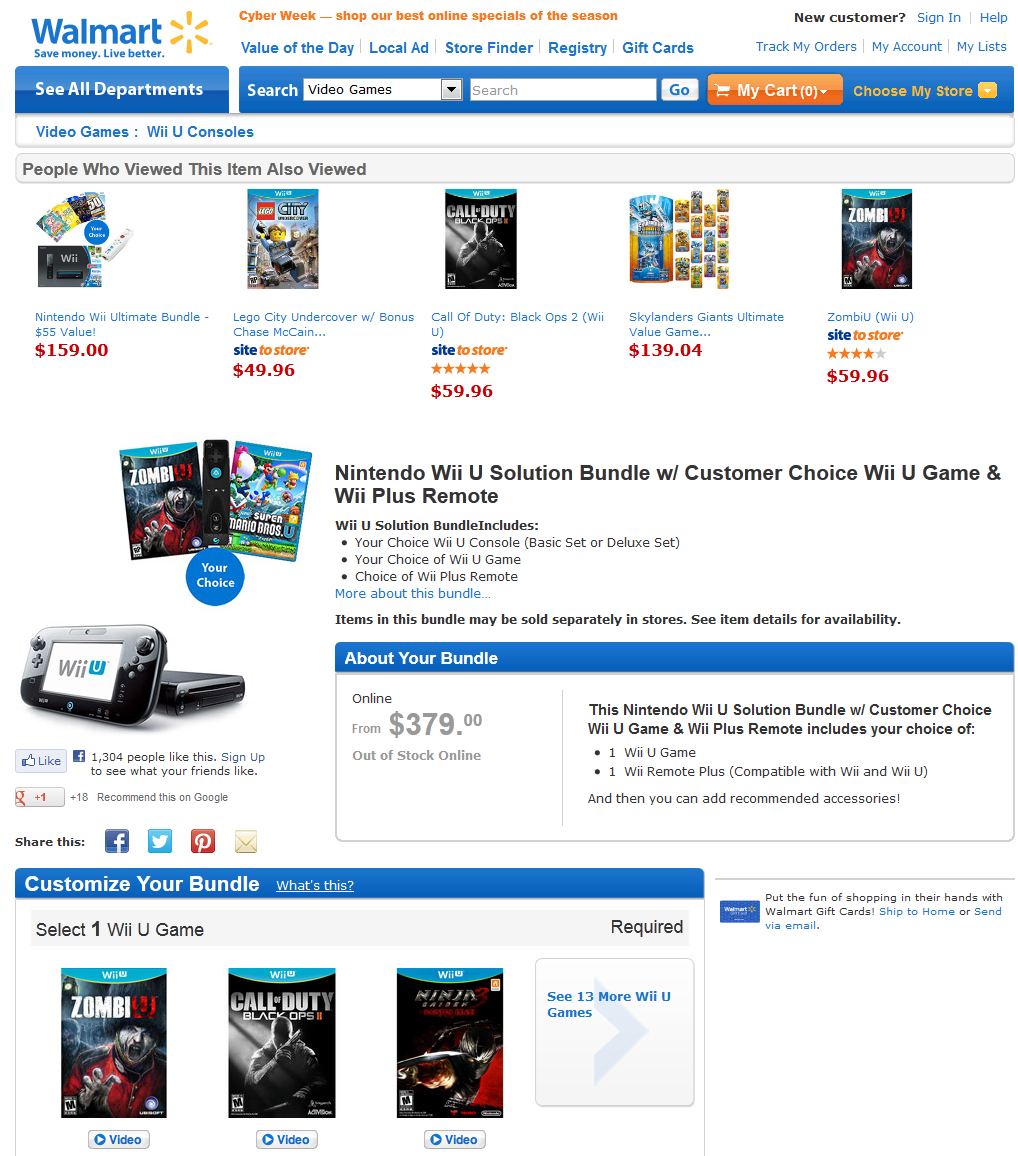
It is also worth mentioning that some sites with "no product available" like Target or Toys R Us might also carry further Google AdSense ads.
Then there are also issues with things like ads that optimize for CTR which end up promoting things like software piracy or the academic versions of software (while lowering the perceived value of the software).
Over the past couple years Google has whacked loads of small ecommerce sites & the general justification is that they don't add enough that is unique, and that they don't deserve to rank as their inventory is unneeded duplication of Amazon & eBay. Many of these small businesses carry inventory and will be driven into insolvency by the sharp shifts in traffic. And while a small store is unneeded duplication, Google still allows syndicated press releases to rank great (and once again SEOs get blamed for Google being Google - see the quote-as-headline here).
Let's presume Google's anti-small business bias is legitimate & look at Google Shopping to see how well they performed in terms of providing a value add editorial function.
A couple days ago I was looking for a product that is somewhat hard to find due to seasonal shopping. It is often available at double or triple retail on sites like eBay, but Google Shopping helped me locate a smaller site that had it available at retail price. Good deal for me & maybe I was wong about Google.
... then again ...
The site they sent me to had the following characteristics:
- URL - not EMD & not a brand, broken English combination
- logo - looks like I designed it AND like I was in a rush when I did it
- about us page - no real information, no contact information (on an ecommerce site!!!), just some obscure stuff about "direct connection with China" & mention of business being 15 years old and having great success
- age - domain is barely a year old & privacy registered
- inbound links - none
- product price - lower than everywhere else
- product level page content - no reviews, thin scraped editorial, editorial repeats itself to fill up more space, 3 adsense blocks in the content area of the page
- no reviews, thin scraped editorial, editorial repeats itself to fill up more space, 3 adsense blocks in the content area of the page
- no reviews, thin scraped editorial, editorial repeats itself to fill up more space, 3 adsense blocks in the content area of the page
- no reviews, thin scraped editorial, editorial repeats itself to fill up more space, 3 adsense blocks in the content area of the page
- the above repetition is to point out the absurdity of the formatting of the "content" of said page
- site search - yet again the adsense feed, searching for the product landing page that was in Google Shopping I get no results (so outside of paid inclusion & front/center placement, Google doesn't even feel this site is worth wasting the resources to index)
- checkout - requires account registration, includes captcha that never matches, hoping you will get frustrated & go back to earlier pages and click an ad

It actually took me a few minutes to figure it out, but the site was designed to look like a phishing site, with intent that perhaps you will click on an ad rather than trying to complete a purchase. The forced registration will eat your email & who knows what they will do with it, but you can never complete your purchase, making the site a complete waste of time.
Looking at the above spam site with some help of tools like NetComber it was apparent that this "merchant" also ran all sorts of scraper sites driven on scraping content from Yahoo! Answers & similar, with sites about Spanish + finance + health + shoes + hedge funds.
It is easy to make complaints about Nextag being a less than perfect user experience. But it is hard to argue that Google is any better. And when other companies have editorial costs that Google lacks (and the other companies would be labeled as spammers if they behaved like Google) over time many competing sites will die off due to the embedded cost structure advantages. Amazon has enoug scale that people are willing to bypass Google's click circus & go directly to Amazon, but most other ecommerce players don't. The rest are largely forced to pay Google's rising rents until they can no longer afford to, then they just disappear.
Bonus Prize: Are You Up to The Google Shopping Test?
The first person who successfully solves this captcha wins a free month membership to our site.





Comments
gwRrp
At least there is no hint of bitterness in your writing - "But Google can come in from the top of the market with an inferior product, displace the competition, economically starve them & eventually create a competitive product over time through a combination of incremental editorial improvements and gutting the traffic & cash flow to competing sites." (probably why I read all the time Aaron!)
It's pretty obvious that captcha says, "GWARP".
"Gwarp" is a form of olde English that means to totally and utterly destroy small business while engaging in anti-competitive practices while operating as a pseudo-governmental front while profiting from the destruction of an open commercial ecosystem.
As used in- "Google totally gwarped my dad's online business, now he's homeless." or "Google just gwarped me for one of their paid placements. No Christmas this year kids." or finally, "I was finally due to get a paycheck from Adsense but Google gwarped me and kept it all".
I think it is the artist formerly known as Prince, right? Is it pronounced "Shar-day"?
it is obvious that this captcha match for "google" :)
Wrong, gwRrp stands for 'Google Will Repeatedly Rape People'
Nice post Aaron. For me, really confusing as to why the 'Hollier than thou' SEOers keep preaching to the masses to work within Google guidelines when they are obviously not playing fair.
Its seriously amazing, its like the church where some SEOers are the pastors along with their brainwashed masses . And Aaron, you 're like the free thinker who keep showing people what the real God (read Google) is like.
I'll guess gwQrp
Great post Aaron! Google Shopping seems to be the last straw over in Europe, with especially in France where Google's offices were raided.
I almost solved it but then Slenderman got me. I'm posting from the great beyond.
Now that Google feels that the little guys are comfortably dealt with, it has started putting in place its plans for the big guys. Amazon and Walmart are in the crosshairs alright and I think they know it. At least Amazon seems to have noticed, with its strategy of not entering paid for Google Shopping. Walmart seems to be a little slow to react online. Hopefully Amazon holds out and continues with this strategy and even possibly fights back. The current fashion is to pick a company that will take the fight to Google and possibly help in their demise. I know I indulge in such guilty pleasures. The favourites appear to Facebook and Microsoft with Apple occasionally thrown into the mix occasionally.
However, Amazon is probably the company that should feel most threatened by Google. Google has looked at that earning capacity and decided they want it for themselves and has acted accordingly. Not only are they attacking Amazon's shop but they are attacking it's cloud based ventures. The Amazon people are some of the smartest people on the web I wont be surprised if at some stage in the near future you see Amazon start fighting back in a more energetic manner.
...they are quietly rolling out an ad network of their own & it is already above a $1 billion per year revenue run rate, while growing quickly. They leverage the items you view on Amazon to help power that ad targeting around the web too. Recently they also announced branded pages, where they will let brands have their own pages on Amazon.com & perhaps start offering brands more purchase data / analytics along with hosting that. Further Verizon is by default loading the Amazon ecosystem on some of their Android phones & I think Kindle Fire is likely the top selling Android device.
So Amazon already is fighting back with ads, building brand relationships & hosting the content, analytics, mobile & tablet. They don't get as much exposure for it though, as they tend to be more quite with their "x will kill y" stuff.
That captcha == "9warp"
Really interesting data about pricegrabber vs yahoo, especially considering it has largely been the exact same content for two years.
GWPRP
I think this is the correct one, lol
Add new comment